28 oct 2018

Israeli occupation forces, on Sunday morning, opened fire at Palestinian farmers in the northern Gaza strip.
Local PNN sources said that Israeli soldiers opened fire on farmers in the town of Beit Hanoun, injuring one of them
Ma’an sources confirmed that one farmer was injured by Israeli forces and transferred to the Beit Hanoun Hospital to receive necessary medical treatment.
The medical condition of the injured Palestinian remained unknown.
Meanwhile, Israeli forces also opened fire at farmers, east of the al-Maghazi refugee camp, in central Gaza.
The farmers were forced to leave their lands in fear for their lives.
No injuries were reported from the incident.
The Israeli army regularly detains and opens fire on unarmed Palestinian fishermen, shepherds and farmers along the border areas if they approach the unilaterally declared buffer zone.
As part of Israel’s blockade of the coastal enclave since 2007, the Israeli army, citing security concerns, requires Palestinian fishermen to work within a limited “designated fishing zone,” the exact limits of which are decided by the Israeli authorities and have historically fluctuated.
Local PNN sources said that Israeli soldiers opened fire on farmers in the town of Beit Hanoun, injuring one of them
Ma’an sources confirmed that one farmer was injured by Israeli forces and transferred to the Beit Hanoun Hospital to receive necessary medical treatment.
The medical condition of the injured Palestinian remained unknown.
Meanwhile, Israeli forces also opened fire at farmers, east of the al-Maghazi refugee camp, in central Gaza.
The farmers were forced to leave their lands in fear for their lives.
No injuries were reported from the incident.
The Israeli army regularly detains and opens fire on unarmed Palestinian fishermen, shepherds and farmers along the border areas if they approach the unilaterally declared buffer zone.
As part of Israel’s blockade of the coastal enclave since 2007, the Israeli army, citing security concerns, requires Palestinian fishermen to work within a limited “designated fishing zone,” the exact limits of which are decided by the Israeli authorities and have historically fluctuated.
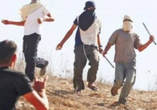
An armed guard of an illegal Israeli colony near Qaryout town, south of the northern West Bank city of Nablus, attacked a member of the town’s local council and a bulldozer driver, while conducting preparation work for a new agricultural road.
Ghassan Daghlas, a Palestinian Authority official who monitors Israeli illegal colonialist activities in northern West Bank, said the two Palestinians were assaulted in Tbeisa area, west of Qaryout.
He added that the Israeli guard assaulted the two to stop the preparation work, and added that the lands are in Area B of the occupied West Bank, under civil Palestinian control, and under full Israeli military control.
The attack is part of numerous violations by the illegal colonialist settlers living in the occupied West Bank, including East Jerusalem, in violation of International Law and the Fourth Geneva Convention.
Ghassan Daghlas, a Palestinian Authority official who monitors Israeli illegal colonialist activities in northern West Bank, said the two Palestinians were assaulted in Tbeisa area, west of Qaryout.
He added that the Israeli guard assaulted the two to stop the preparation work, and added that the lands are in Area B of the occupied West Bank, under civil Palestinian control, and under full Israeli military control.
The attack is part of numerous violations by the illegal colonialist settlers living in the occupied West Bank, including East Jerusalem, in violation of International Law and the Fourth Geneva Convention.
27 oct 2018
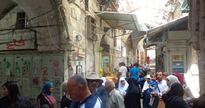
Dozens of Israeli settlers on Saturday evening closed a Palestinian market in the Old City of al-Khalil and assaulted vegetable sellers.
The PIC reporter said that scores of Israeli settlers, on their way to perform Talmudic rituals in the Ibrahimi Mosque, stormed al-Kazazin market and closed its gate.
He added that the settlers assaulted some vegetable sellers, destroyed their stalls, and chanted slogans insulting Arabs.
Israeli settlers have lately stepped up their attacks on the Palestinian citizens and shop owners in the Old City of al-Khalil in an attempt to push them to leave the area and abandon their homes and shops.
The PIC reporter said that scores of Israeli settlers, on their way to perform Talmudic rituals in the Ibrahimi Mosque, stormed al-Kazazin market and closed its gate.
He added that the settlers assaulted some vegetable sellers, destroyed their stalls, and chanted slogans insulting Arabs.
Israeli settlers have lately stepped up their attacks on the Palestinian citizens and shop owners in the Old City of al-Khalil in an attempt to push them to leave the area and abandon their homes and shops.
26 oct 2018
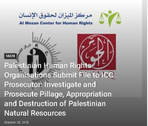
Today, on 26 October 2018, Al-Haq, Al Mezan Center for Human Rights and the Palestinian Center for Human Rights (PCHR) submitted a 500-page file on alleged crimes committed by Israelis, in particular high-level Israeli officials, and individuals associated with corporations that are extracting and destroying Palestinian natural resources.
The organisations provide a reasonable basis to believe that Israelis and private actors have committed the war crimes of extensive destruction and appropriation of property, pillage, and destruction and seizure of property.
The confidential communication provides factual information and legal analysis on the exploitation and destruction of Palestinian water, agricultural land, minerals, mud, stone, and oil.
Mr. Shawan Jabarin, Al-Haq’s General Director, said that “in situations of armed conflict, the trade and business in natural resources have often been strong incentives for war and violence, and provided the finances necessary to maintain and prolong an armed conflict.
The situation in Palestine is a case of such exploitation, in which Israelis and private actors have been deliberately and openly exploiting Palestinian natural resources for at least five decades.
The exploitation of Palestinian natural resources by Israel, Israelis, as well as corporations, finances and thereby sustains and allows for the expansion of Israeli settlements, including by providing profitable employment to settlers and a secure living environment.”
Mr. Issam Younis, Al Mezan’s Director, also said that “Israel, acting as the Occupying Power has engaged in a deliberate and wide-scale exploitation and destruction of significant Palestinian resources in the OPT, as part of an overall policy to annex, exercise sovereignty, and ensure full non-consensual Israeli domination over Palestinian territory.”
Israel, along with and through Israeli and international non-state actors, including corporations, have unlawfully extracted Palestinian natural resources in the OPT, without the lawful consent of the occupied population therein, and solely for the benefit of the Israeli economy and population, including illegal Israeli settlements.
Israel has also permitted and encouraged private actors to exploit Palestinian natural resources. Such private actors include business enterprises in agricultural and industrial settlements, as well as Israeli and multinational corporations.
Israel’s unrestricted and unilateral exploitation of Palestinian natural resources will eventually lead to the depletion of Palestinian natural resources, to the detriment of the Palestinian occupied population and in violation of Israel’s customary international law obligations.
Furthermore, the appropriation, destruction, seizure, and pillaging of Palestinian natural resources have serious social, economic, and environmental impact on the affected Palestinian communities, and notably infringe on Palestinians’ fundamental right to self-determination.
Mr. Raji Sourani, PCHR Director, said that “considering crimes committed in relation to the exploitation of Palestinian natural resources and the colonisation of the occupied territory, with complete impunity, the ICC Prosecutor must urgently open an investigation into the situation in Palestine.”
This is the sixth Article 15 communication to the Prosecutor of the International Criminal Court (ICC), and it complements the file submitted to the Prosecutor in September 2017 concerning inter alia the transfer of Israeli settlers into the occupied territory, appropriation of Palestinian land, and forcible transfer of the protected Palestinian population.
The organisations provide a reasonable basis to believe that Israelis and private actors have committed the war crimes of extensive destruction and appropriation of property, pillage, and destruction and seizure of property.
The confidential communication provides factual information and legal analysis on the exploitation and destruction of Palestinian water, agricultural land, minerals, mud, stone, and oil.
Mr. Shawan Jabarin, Al-Haq’s General Director, said that “in situations of armed conflict, the trade and business in natural resources have often been strong incentives for war and violence, and provided the finances necessary to maintain and prolong an armed conflict.
The situation in Palestine is a case of such exploitation, in which Israelis and private actors have been deliberately and openly exploiting Palestinian natural resources for at least five decades.
The exploitation of Palestinian natural resources by Israel, Israelis, as well as corporations, finances and thereby sustains and allows for the expansion of Israeli settlements, including by providing profitable employment to settlers and a secure living environment.”
Mr. Issam Younis, Al Mezan’s Director, also said that “Israel, acting as the Occupying Power has engaged in a deliberate and wide-scale exploitation and destruction of significant Palestinian resources in the OPT, as part of an overall policy to annex, exercise sovereignty, and ensure full non-consensual Israeli domination over Palestinian territory.”
Israel, along with and through Israeli and international non-state actors, including corporations, have unlawfully extracted Palestinian natural resources in the OPT, without the lawful consent of the occupied population therein, and solely for the benefit of the Israeli economy and population, including illegal Israeli settlements.
Israel has also permitted and encouraged private actors to exploit Palestinian natural resources. Such private actors include business enterprises in agricultural and industrial settlements, as well as Israeli and multinational corporations.
Israel’s unrestricted and unilateral exploitation of Palestinian natural resources will eventually lead to the depletion of Palestinian natural resources, to the detriment of the Palestinian occupied population and in violation of Israel’s customary international law obligations.
Furthermore, the appropriation, destruction, seizure, and pillaging of Palestinian natural resources have serious social, economic, and environmental impact on the affected Palestinian communities, and notably infringe on Palestinians’ fundamental right to self-determination.
Mr. Raji Sourani, PCHR Director, said that “considering crimes committed in relation to the exploitation of Palestinian natural resources and the colonisation of the occupied territory, with complete impunity, the ICC Prosecutor must urgently open an investigation into the situation in Palestine.”
This is the sixth Article 15 communication to the Prosecutor of the International Criminal Court (ICC), and it complements the file submitted to the Prosecutor in September 2017 concerning inter alia the transfer of Israeli settlers into the occupied territory, appropriation of Palestinian land, and forcible transfer of the protected Palestinian population.

Dozens of Israeli settlers on Friday evening, under the protection of the Israeli army, stormed al-Khirba archaeological area in Tuqu' town, south of Bethlehem.
The PIC reporter said that the settlers stormed the area and performed Talmudic rituals, while the Israeli army threw a cordon around the place and prevented Palestinian citizens from leaving their houses or approaching the neighboring olive fields.
The settlers cut down some olive trees, and when they left the place, limited clashes broke out between the Israeli soldiers and Palestinian youths.
The PIC reporter said that the settlers stormed the area and performed Talmudic rituals, while the Israeli army threw a cordon around the place and prevented Palestinian citizens from leaving their houses or approaching the neighboring olive fields.
The settlers cut down some olive trees, and when they left the place, limited clashes broke out between the Israeli soldiers and Palestinian youths.
25 oct 2018

The Israeli Occupation Forces (IOF) distributed on Thursday military orders to a number of Bedouin families to halt construction of their 17 facilities in the Jordan Valley.
Bedouin families in the northern Jordan Valley were ordered by the Israeli military to stop construction of 17 agricultural facilities in Khirbet Thra’a Awad and Maksar for allegedly being built without permit, Aref Daraghmeh, a local rights activist, said on Thursday.
Daraghmeh called on human rights institutions to intervene and to support the Bedouin families especially as winter season approaches.
Meanwhile, Israeli forces erected early today a number of tents in Agnissnia northwest of Nablus, to the north of West Bank, as a prelude to conduct military training.
Palestinian-owned agricultural lands were stormed during the military exercises, local sources told PIC reporter.
Palestinians were prevented from reaching their lands, they added.
Bedouin families in the northern Jordan Valley were ordered by the Israeli military to stop construction of 17 agricultural facilities in Khirbet Thra’a Awad and Maksar for allegedly being built without permit, Aref Daraghmeh, a local rights activist, said on Thursday.
Daraghmeh called on human rights institutions to intervene and to support the Bedouin families especially as winter season approaches.
Meanwhile, Israeli forces erected early today a number of tents in Agnissnia northwest of Nablus, to the north of West Bank, as a prelude to conduct military training.
Palestinian-owned agricultural lands were stormed during the military exercises, local sources told PIC reporter.
Palestinians were prevented from reaching their lands, they added.
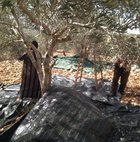
ISM volunteers spent the day harvesting olives with farmers in Bruqin village, a day that began with Israeli soldiers confronting the farmer and his family and ordering them to leave their land no later than 5 p.m.
Since the harvest workday typically concludes around 4 p.m., this did not prove an obstacle for the harvesters. But it was a potent reminder that the residents of Bruqin, a primarily agrarian village located in the fertile Salfit governorate area, continue to lose control over and access to their land due to ongoing Israeli military occupation.
In the last few decades, Israel has expropriated hundreds of dunams of land from Bruqin in order to build Israeli settlements, settlement “outposts,” military checkpoints, and Israeli-only settler by-pass roads. Bruqin village has existed since Roman times. Yet Israel’s historically recent military occupation is swiftly eroding this village’s existence.
Despite the vastness of the olive groves in which they were working, the buildings and vast structures of the hilltop settlements of Bruchin and Barkan Industrial Zone proved impossible for volunteers to overlook. These settlements are connected by settlement highway roads 5 and 446, which were both audible and visible from the land where volunteers were working. The sound of cars zooming by on the settler roads was ever-present.
Since its creation, Barkan Industrial Zone has pumped its wastewater into Bruqin’s agricultural land, causing pollution and the spread of disease in both humans and animals. As volunteers walked through the groves of olive trees, the stench of human waste was palpable, even in the middle of wide-open farmland. This “policy” is a continuation of past practice when Ariel, another nearby settlement, began channeling its sewage into the northeast side of the village more than twenty years ago.
Palestinians and ISM volunteers were able to harvest the rest of the day without further Zionist interference. In conversation with the farmer, however, ISMers asked the name of the settlement looming over them as they worked. They were initially confused by his answer, because it sounded as though he were simply saying the name of his own village.
Carefully re-iterating and exaggerating the slight difference in pronunciation between “Bruqin” and “Bruchin” for his international listeners, the farmer explained, “They take everything. They take our land, they take our freedom. Then they take our names.”
Since the harvest workday typically concludes around 4 p.m., this did not prove an obstacle for the harvesters. But it was a potent reminder that the residents of Bruqin, a primarily agrarian village located in the fertile Salfit governorate area, continue to lose control over and access to their land due to ongoing Israeli military occupation.
In the last few decades, Israel has expropriated hundreds of dunams of land from Bruqin in order to build Israeli settlements, settlement “outposts,” military checkpoints, and Israeli-only settler by-pass roads. Bruqin village has existed since Roman times. Yet Israel’s historically recent military occupation is swiftly eroding this village’s existence.
Despite the vastness of the olive groves in which they were working, the buildings and vast structures of the hilltop settlements of Bruchin and Barkan Industrial Zone proved impossible for volunteers to overlook. These settlements are connected by settlement highway roads 5 and 446, which were both audible and visible from the land where volunteers were working. The sound of cars zooming by on the settler roads was ever-present.
Since its creation, Barkan Industrial Zone has pumped its wastewater into Bruqin’s agricultural land, causing pollution and the spread of disease in both humans and animals. As volunteers walked through the groves of olive trees, the stench of human waste was palpable, even in the middle of wide-open farmland. This “policy” is a continuation of past practice when Ariel, another nearby settlement, began channeling its sewage into the northeast side of the village more than twenty years ago.
Palestinians and ISM volunteers were able to harvest the rest of the day without further Zionist interference. In conversation with the farmer, however, ISMers asked the name of the settlement looming over them as they worked. They were initially confused by his answer, because it sounded as though he were simply saying the name of his own village.
Carefully re-iterating and exaggerating the slight difference in pronunciation between “Bruqin” and “Bruchin” for his international listeners, the farmer explained, “They take everything. They take our land, they take our freedom. Then they take our names.”
24 oct 2018

Israeli authorities allowed on Wednesday the entry of Qatar-funded fuel shipments into the blockaded Gaza Strip.
According to Hebrew-language news outlets, Israeli Army Minister Avigdor Lieberman decided to allow fuel supplies to enter the besieged Gaza Strip.
" Upon recommendations from security agencies, it has been decided to resume Qatari fuel shipments into Gaza," Lieberman said.
Ten days ago, Lieberman ordered a halt to fuel shipments into Gaza, citing “violence” along border with the Gaza Strip.
It is noteworthy that Gaza's daily demand of power is between 450 to 500 Megawatts. However, the enclave has struggled for 11 years with power shortages due to limited fuel access and degraded infrastructure.
According to Hebrew-language news outlets, Israeli Army Minister Avigdor Lieberman decided to allow fuel supplies to enter the besieged Gaza Strip.
" Upon recommendations from security agencies, it has been decided to resume Qatari fuel shipments into Gaza," Lieberman said.
Ten days ago, Lieberman ordered a halt to fuel shipments into Gaza, citing “violence” along border with the Gaza Strip.
It is noteworthy that Gaza's daily demand of power is between 450 to 500 Megawatts. However, the enclave has struggled for 11 years with power shortages due to limited fuel access and degraded infrastructure.
23 oct 2018

The Al-Mezan Center for Human Rights issued a statement strongly condemning the ongoing Israeli violations against the Palestinian fishermen, and the illegal confiscation of their boats, and called for the release of four fishermen, who were taken prisoner by the navy, on Tuesday, in two separate attacks.
Al-Mezan said its field investigations have revealed that, at 6:30 on Tuesday morning, Israeli navy ships opened fire at Palestinian fishing boats, nearly two nautical in Gaza territorial waters in the al-Waha sea in Beit Lahia, in the northern part of the coastal region, before surrounding a small boat with two fishermen onboard, and abducted them.
The two fishermen have been identified as Awad Nafeth Sultan, 21, from Beit Lahia, and Ahmad Emad Siyam, 20, from the Shati refugee camp, west of Gaza city. They were taken to an unknown destination, and their boat was confiscated.
Al-Mezan added that, approximately at one in the afternoon of the same day, the navy fired many live rounds at Palestinian fishing boats, less than four nautical miles from the shore, in Sheikh Ejleen Beach, southwest of Gaza city, and surrounded them, before abducting two fishermen, and confiscated their boat.
The two fishermen have been identified as Mahmoud Mohammad Miqdad, 35, and Hasan Soheil Miqdad, 26, from the Shati’ refugee camp.
Field research and documentation by the al-Mezan Center revealed that the Israeli navy carried 270 violations against Palestinian fishermen and their boats, since the beginning of this year, and that the navy fired live rounds at the boats 267 times, killing one fisherman, in addition to wounding sixteen others, and abducting 59, in addition to confiscating 18 boats.
It is worth mentioning that the slain fisherman, identified as Ismael Saleh Abu Ryala, 18, was killed when the Israeli navy opened fire on his fishing boat while he was fishing near the shore of Gaza.
It added that Israel continues to ban the entry of equipment and tools needed for fishing, as part of its ongoing and deadly siege on Gaza.
Al-Mezan called for the release of all abducted fishermen, and their boats, and demanded the international community to act on lifting the Israeli siege on Gaza, and ending the seriously escalating violations of international law, the Fourth Geneva Convention, and all related United Nations and human rights treaties.
It said that Israel continues to abduct, humiliate and harm the fishermen, in addition to the destruction of their boats and equipment, as part of its illegal siege on Gaza, and its deliberate violation against the civilian population.
Meanwhile, Israeli news outlets reported that Israel expanded the allowed fishing zone from the current three nautical miles, however, Israeli naval forces opened fire at several fishing boats, as they were working within the permitted fishing zone, forcing them to sail back to shore.
Following the latest Israeli offensive on the Gaza Strip in 2014, a ceasefire agreement between Israel and Palestinian armed groups was brokered by the Egyptian government, which allowed fishermen to sail up to 6 nautical miles, but Israel continued to violate the agreement.
Under the Oslo Accord, signed between Israel and the Palestine Liberation Organization in 1994, Israel is supposed to allow the Palestinian to fish and sail within 20 nautical miles.
Updated From:
Navy Opens Fire, Detains 2 Gazan Fishermen
Oct 23, 2018 @ 19:46
Israeli naval forces detained two Palestinian fishermen on Tuesday, off the coast of the besieged northern Gaza Strip.
Head of the Fishermen Union in Gaza, Nizar Ayyash, told Ma’an News Agency that two Palestinian fishermen were detained by Israeli naval forces off the coast of the al-Waha area, in northern Gaza.
Ayyash identified the two fishermen as Awad al-Sultan and Ahmad Siyam.
The fishermen were transferred to an unknown location.
Meanwhile, Israeli news outlets reported that Israel expanded the allowed fishing zone from the current three nautical miles, however, Israeli naval forces opened fire at several fishing boats, as they were working within the permitted fishing zone, forcing them to sail back to shore.
No injuries were reported.
The Israeli army regularly detains and opens fire on unarmed Palestinian fishermen, shepherds, and farmers along the border areas if they approach the unilaterally declared buffer zone.
Israeli human rights group B’Tselem recently concluded that Israel’s Gaza closure and “harassment of fishermen” have been “destroying Gaza’s fishing sector,” with 95% of fishermen living below the poverty line.
Last Wednesday, Israeli Minister of Defense Avigdor Lieberman closed the border crossings of both Erez and Karem Abu Salem.
Al-Mezan said its field investigations have revealed that, at 6:30 on Tuesday morning, Israeli navy ships opened fire at Palestinian fishing boats, nearly two nautical in Gaza territorial waters in the al-Waha sea in Beit Lahia, in the northern part of the coastal region, before surrounding a small boat with two fishermen onboard, and abducted them.
The two fishermen have been identified as Awad Nafeth Sultan, 21, from Beit Lahia, and Ahmad Emad Siyam, 20, from the Shati refugee camp, west of Gaza city. They were taken to an unknown destination, and their boat was confiscated.
Al-Mezan added that, approximately at one in the afternoon of the same day, the navy fired many live rounds at Palestinian fishing boats, less than four nautical miles from the shore, in Sheikh Ejleen Beach, southwest of Gaza city, and surrounded them, before abducting two fishermen, and confiscated their boat.
The two fishermen have been identified as Mahmoud Mohammad Miqdad, 35, and Hasan Soheil Miqdad, 26, from the Shati’ refugee camp.
Field research and documentation by the al-Mezan Center revealed that the Israeli navy carried 270 violations against Palestinian fishermen and their boats, since the beginning of this year, and that the navy fired live rounds at the boats 267 times, killing one fisherman, in addition to wounding sixteen others, and abducting 59, in addition to confiscating 18 boats.
It is worth mentioning that the slain fisherman, identified as Ismael Saleh Abu Ryala, 18, was killed when the Israeli navy opened fire on his fishing boat while he was fishing near the shore of Gaza.
It added that Israel continues to ban the entry of equipment and tools needed for fishing, as part of its ongoing and deadly siege on Gaza.
Al-Mezan called for the release of all abducted fishermen, and their boats, and demanded the international community to act on lifting the Israeli siege on Gaza, and ending the seriously escalating violations of international law, the Fourth Geneva Convention, and all related United Nations and human rights treaties.
It said that Israel continues to abduct, humiliate and harm the fishermen, in addition to the destruction of their boats and equipment, as part of its illegal siege on Gaza, and its deliberate violation against the civilian population.
Meanwhile, Israeli news outlets reported that Israel expanded the allowed fishing zone from the current three nautical miles, however, Israeli naval forces opened fire at several fishing boats, as they were working within the permitted fishing zone, forcing them to sail back to shore.
Following the latest Israeli offensive on the Gaza Strip in 2014, a ceasefire agreement between Israel and Palestinian armed groups was brokered by the Egyptian government, which allowed fishermen to sail up to 6 nautical miles, but Israel continued to violate the agreement.
Under the Oslo Accord, signed between Israel and the Palestine Liberation Organization in 1994, Israel is supposed to allow the Palestinian to fish and sail within 20 nautical miles.
Updated From:
Navy Opens Fire, Detains 2 Gazan Fishermen
Oct 23, 2018 @ 19:46
Israeli naval forces detained two Palestinian fishermen on Tuesday, off the coast of the besieged northern Gaza Strip.
Head of the Fishermen Union in Gaza, Nizar Ayyash, told Ma’an News Agency that two Palestinian fishermen were detained by Israeli naval forces off the coast of the al-Waha area, in northern Gaza.
Ayyash identified the two fishermen as Awad al-Sultan and Ahmad Siyam.
The fishermen were transferred to an unknown location.
Meanwhile, Israeli news outlets reported that Israel expanded the allowed fishing zone from the current three nautical miles, however, Israeli naval forces opened fire at several fishing boats, as they were working within the permitted fishing zone, forcing them to sail back to shore.
No injuries were reported.
The Israeli army regularly detains and opens fire on unarmed Palestinian fishermen, shepherds, and farmers along the border areas if they approach the unilaterally declared buffer zone.
Israeli human rights group B’Tselem recently concluded that Israel’s Gaza closure and “harassment of fishermen” have been “destroying Gaza’s fishing sector,” with 95% of fishermen living below the poverty line.
Last Wednesday, Israeli Minister of Defense Avigdor Lieberman closed the border crossings of both Erez and Karem Abu Salem.
22 oct 2018
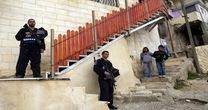
The Israeli military razed on Monday 16 dunums of privately-owned Palestinian land in Tarqoumia town, in the southern occupied West Bank, and uprooted dozens of olive trees.
According to local sources, Israeli forces raided Tarqoumia, leveled Palestinian lands, and chopped 260 olive trees.
At the same time, the occupation army further destroyed three water wells owned by the Palestinian citizens Mohamed Jaafra and Awad Fatafta.
According to local sources, Israeli forces raided Tarqoumia, leveled Palestinian lands, and chopped 260 olive trees.
At the same time, the occupation army further destroyed three water wells owned by the Palestinian citizens Mohamed Jaafra and Awad Fatafta.
21 oct 2018
|
|
Several illegal Israeli settlers were videotaped, Saturday, throwing rocks at Palestinians in the village of Burin, southwest of the northern West Bank of Nablus.
They were seen throwing rocks at residences in the Nablus Governorate under the cover of Israeli forces whom stood guard for the colonizers. Quds News Network said the Palestinians were harvesting their olives when the settlers attacked. Yahia Qadous, the head of the Local Village Council in Burin, said the assailants came from Yitzhar colony, which was built on private Palestinian lands, in the southeastern area of the village. |
Qadous added that the Palestinians tried to remove the invading colonists, while the soldiers attacked them with gas bombs.
Page: 37 - 36 - 35 - 34 - 33 - 32 - 31 - 30 - 29 - 28 - 27 - 26 - 25 - 24 - 23 - 22 - 21 - 20 - 19 - 18 - 17 - 16
